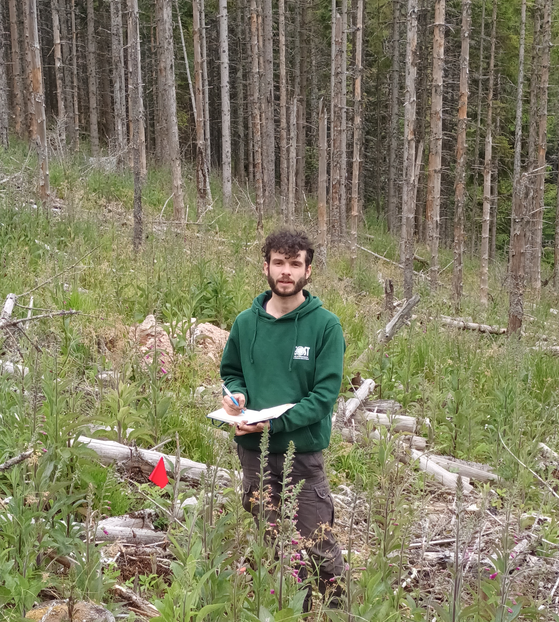

Perturbations des cycles biogéochimiques des nutriments dans les sols des forêts d’épicéas en déclin du bassin versant du Strengbach (Vosges, France) étudiées par observation, expérimentation et modélisation Disturbances in the biogeochemical cycling of nutrients in the soils of declining spruce forests in the Strengbach watershed (Vosges, France) studied through observation, experimentation and modelling
Doctorant depuis le 01-10-2023, sous la direction de Marie-Claire Pierret et Emilie Beaulieu
email : a.saphy[at]unistra.fr
... better understand how drought affects biogeochemical processes in spruce forests, which are particularly unresilient to drought events and to the climate change that is ongoing in the Vosges Mountains.
PhD student in biogeochemistry of forest ecosystems
We propose an approach combining field observations in the OHGE (https://ohge.unistra.fr/), laboratory experiments and modelling to better understand biogeochemical disturbances of nutrient dynamics in forest soil.
The Observatoire HydroGeochimique de l'Environnement (OHGE; Strengbach watershed) is a forested ecosystem monitored since 1986 in the Vosges mountains. It's a place where hydrologists, geochemists, geophysicists, and ecophysiologists collaborate and develop new tools to better understand mountain forest ecosystems. Among other things, we study the chemistry of soil solution at different depths under spruce plots (at various stages of decline). This continuous temporal data allows us to observe the consequences of various disturbances affecting forest ecosystems. Drought events (such as the last severest drought in summer 2022) severely disrupt nutrient biogeochemistry in soil and affect soil fertility. The interdisciplinary approach, combining meteorological monitoring, soil hydrology modelling, mineral and organic analysis of soil solution composition, allows us to better understand how drought affects biogeochemical processes in spruce forest, which are particularly unresilient to drought events and to the climate change that is ongoing in the Vosges Mountains. This is also an experimental site where various sylvicultural practices are also tested such as liming, to compensate for the deficiency in alkaline earth nutrients and reduce soil acidity. Other practices, such as different types of trees cut after spruce dieback (due to bark beetle outbreak), also affect nutrient dynamics in soil and we try to understand how by studying the chemistry of soils and soil solutions.
In addition, percolation experiments on soil columns, with soil coming from the Strengbach catchment, have been designed. The objective is to decrease the complexity of natural ecosystems and to identify and deconvolve experimentally (under controlled conditions) different biogeochemical processes. Perturbations such as drought or liming are tested on column experiments to better understand the consequences observed in the field.
The modelling of those processes is made by coupling hydrological and geochemical modelling. The idea is to better calibrate the model thanks to experimental data with the aim of better representing processes in the field.
Particular attention is given to the understanding of the dynamics of the exchangeable cations and their interaction with organic matter. That implies an analytical development of soil organic matter and dissolved organic matter charcaterisation with Py-GC-MS, FTIR, Fluorescence and Absorbance.
